401005 Essay: Psychosocial Development and Nursing Practice
VerifiedAdded on 2022/12/23
|6
|1937
|22
Essay
AI Summary
This essay delves into the crucial aspects of psychosocial development in children aged 2-5 years, highlighting Erikson's stages of development, particularly autonomy vs. shame and doubt, and initiative vs. guilt. It defines psychosocial development and connects it to Erikson's theory, referencing a case study of a 2.5-year-old male. The essay explores normative psychosocial examples, such as toilet training and language development, and identifies factors influencing psychosocial development, including parenting styles and the Bronfenbrenner's ecological systems theory. Furthermore, it emphasizes the vital role of nurses in understanding and applying knowledge of psychosocial development to provide optimal, holistic, and person-centered care for toddlers and their families, particularly in addressing parental concerns and promoting healthy development.
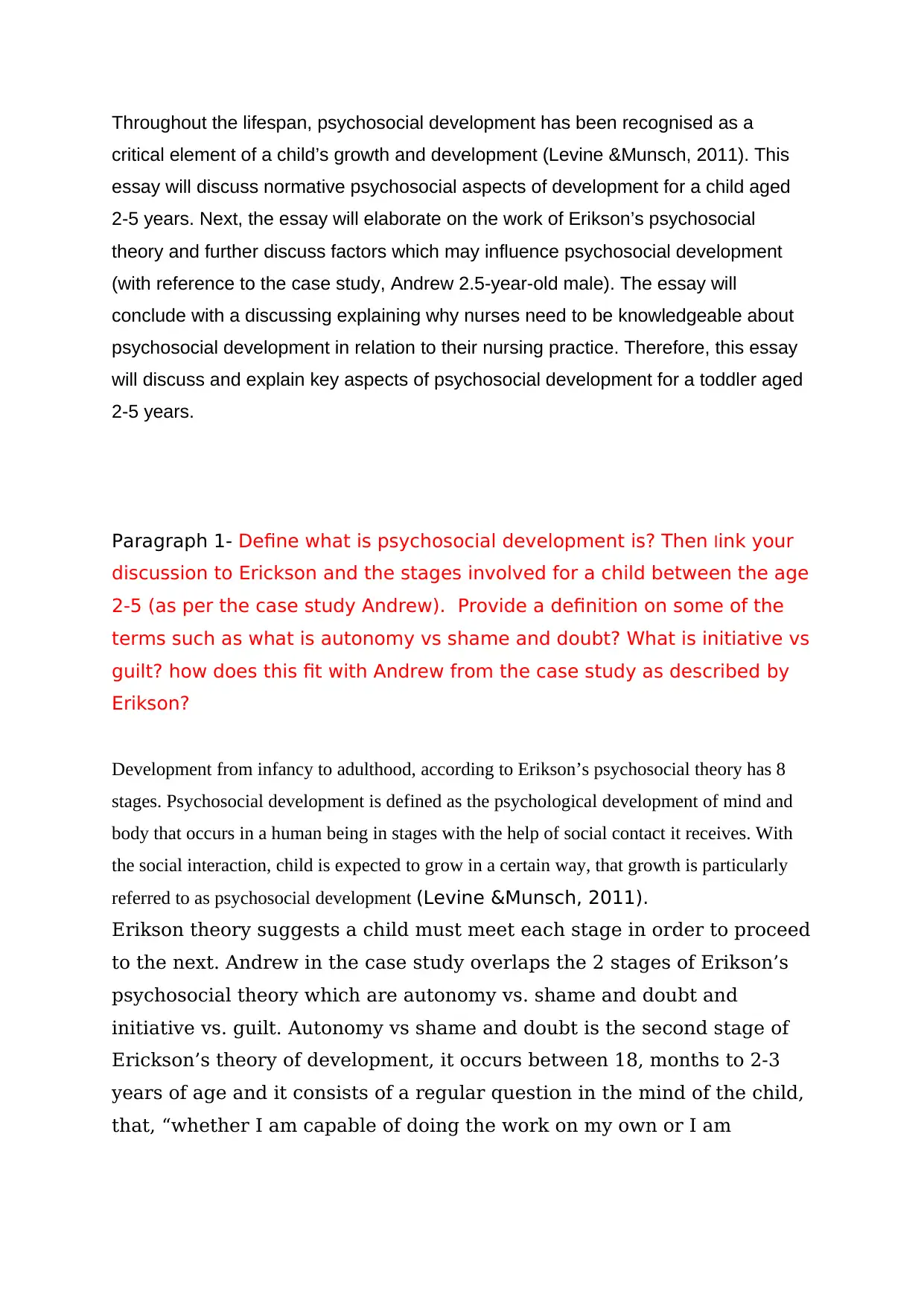
Throughout the lifespan, psychosocial development has been recognised as a
critical element of a child’s growth and development (Levine &Munsch, 2011). This
essay will discuss normative psychosocial aspects of development for a child aged
2-5 years. Next, the essay will elaborate on the work of Erikson’s psychosocial
theory and further discuss factors which may influence psychosocial development
(with reference to the case study, Andrew 2.5-year-old male). The essay will
conclude with a discussing explaining why nurses need to be knowledgeable about
psychosocial development in relation to their nursing practice. Therefore, this essay
will discuss and explain key aspects of psychosocial development for a toddler aged
2-5 years.
Paragraph 1- Define what is psychosocial development is? Then link your
discussion to Erickson and the stages involved for a child between the age
2-5 (as per the case study Andrew). Provide a definition on some of the
terms such as what is autonomy vs shame and doubt? What is initiative vs
guilt? how does this fit with Andrew from the case study as described by
Erikson?
Development from infancy to adulthood, according to Erikson’s psychosocial theory has 8
stages. Psychosocial development is defined as the psychological development of mind and
body that occurs in a human being in stages with the help of social contact it receives. With
the social interaction, child is expected to grow in a certain way, that growth is particularly
referred to as psychosocial development (Levine &Munsch, 2011).
Erikson theory suggests a child must meet each stage in order to proceed
to the next. Andrew in the case study overlaps the 2 stages of Erikson’s
psychosocial theory which are autonomy vs. shame and doubt and
initiative vs. guilt. Autonomy vs shame and doubt is the second stage of
Erickson’s theory of development, it occurs between 18, months to 2-3
years of age and it consists of a regular question in the mind of the child,
that, “whether I am capable of doing the work on my own or I am
critical element of a child’s growth and development (Levine &Munsch, 2011). This
essay will discuss normative psychosocial aspects of development for a child aged
2-5 years. Next, the essay will elaborate on the work of Erikson’s psychosocial
theory and further discuss factors which may influence psychosocial development
(with reference to the case study, Andrew 2.5-year-old male). The essay will
conclude with a discussing explaining why nurses need to be knowledgeable about
psychosocial development in relation to their nursing practice. Therefore, this essay
will discuss and explain key aspects of psychosocial development for a toddler aged
2-5 years.
Paragraph 1- Define what is psychosocial development is? Then link your
discussion to Erickson and the stages involved for a child between the age
2-5 (as per the case study Andrew). Provide a definition on some of the
terms such as what is autonomy vs shame and doubt? What is initiative vs
guilt? how does this fit with Andrew from the case study as described by
Erikson?
Development from infancy to adulthood, according to Erikson’s psychosocial theory has 8
stages. Psychosocial development is defined as the psychological development of mind and
body that occurs in a human being in stages with the help of social contact it receives. With
the social interaction, child is expected to grow in a certain way, that growth is particularly
referred to as psychosocial development (Levine &Munsch, 2011).
Erikson theory suggests a child must meet each stage in order to proceed
to the next. Andrew in the case study overlaps the 2 stages of Erikson’s
psychosocial theory which are autonomy vs. shame and doubt and
initiative vs. guilt. Autonomy vs shame and doubt is the second stage of
Erickson’s theory of development, it occurs between 18, months to 2-3
years of age and it consists of a regular question in the mind of the child,
that, “whether I am capable of doing the work on my own or I am
Paraphrase This Document
Need a fresh take? Get an instant paraphrase of this document with our AI Paraphraser
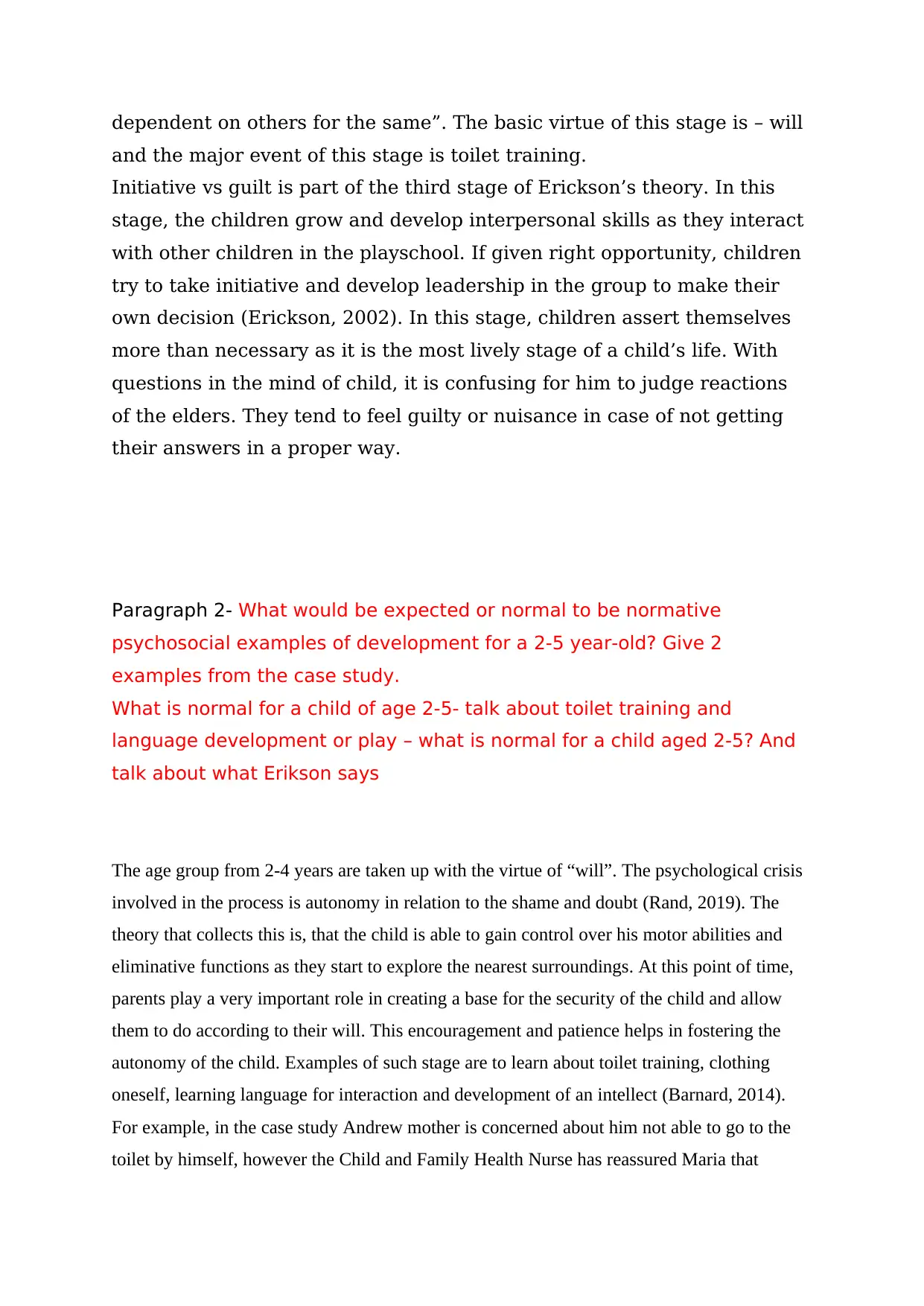
dependent on others for the same”. The basic virtue of this stage is – will
and the major event of this stage is toilet training.
Initiative vs guilt is part of the third stage of Erickson’s theory. In this
stage, the children grow and develop interpersonal skills as they interact
with other children in the playschool. If given right opportunity, children
try to take initiative and develop leadership in the group to make their
own decision (Erickson, 2002). In this stage, children assert themselves
more than necessary as it is the most lively stage of a child’s life. With
questions in the mind of child, it is confusing for him to judge reactions
of the elders. They tend to feel guilty or nuisance in case of not getting
their answers in a proper way.
Paragraph 2- What would be expected or normal to be normative
psychosocial examples of development for a 2-5 year-old? Give 2
examples from the case study.
What is normal for a child of age 2-5- talk about toilet training and
language development or play – what is normal for a child aged 2-5? And
talk about what Erikson says
The age group from 2-4 years are taken up with the virtue of “will”. The psychological crisis
involved in the process is autonomy in relation to the shame and doubt (Rand, 2019). The
theory that collects this is, that the child is able to gain control over his motor abilities and
eliminative functions as they start to explore the nearest surroundings. At this point of time,
parents play a very important role in creating a base for the security of the child and allow
them to do according to their will. This encouragement and patience helps in fostering the
autonomy of the child. Examples of such stage are to learn about toilet training, clothing
oneself, learning language for interaction and development of an intellect (Barnard, 2014).
For example, in the case study Andrew mother is concerned about him not able to go to the
toilet by himself, however the Child and Family Health Nurse has reassured Maria that
and the major event of this stage is toilet training.
Initiative vs guilt is part of the third stage of Erickson’s theory. In this
stage, the children grow and develop interpersonal skills as they interact
with other children in the playschool. If given right opportunity, children
try to take initiative and develop leadership in the group to make their
own decision (Erickson, 2002). In this stage, children assert themselves
more than necessary as it is the most lively stage of a child’s life. With
questions in the mind of child, it is confusing for him to judge reactions
of the elders. They tend to feel guilty or nuisance in case of not getting
their answers in a proper way.
Paragraph 2- What would be expected or normal to be normative
psychosocial examples of development for a 2-5 year-old? Give 2
examples from the case study.
What is normal for a child of age 2-5- talk about toilet training and
language development or play – what is normal for a child aged 2-5? And
talk about what Erikson says
The age group from 2-4 years are taken up with the virtue of “will”. The psychological crisis
involved in the process is autonomy in relation to the shame and doubt (Rand, 2019). The
theory that collects this is, that the child is able to gain control over his motor abilities and
eliminative functions as they start to explore the nearest surroundings. At this point of time,
parents play a very important role in creating a base for the security of the child and allow
them to do according to their will. This encouragement and patience helps in fostering the
autonomy of the child. Examples of such stage are to learn about toilet training, clothing
oneself, learning language for interaction and development of an intellect (Barnard, 2014).
For example, in the case study Andrew mother is concerned about him not able to go to the
toilet by himself, however the Child and Family Health Nurse has reassured Maria that
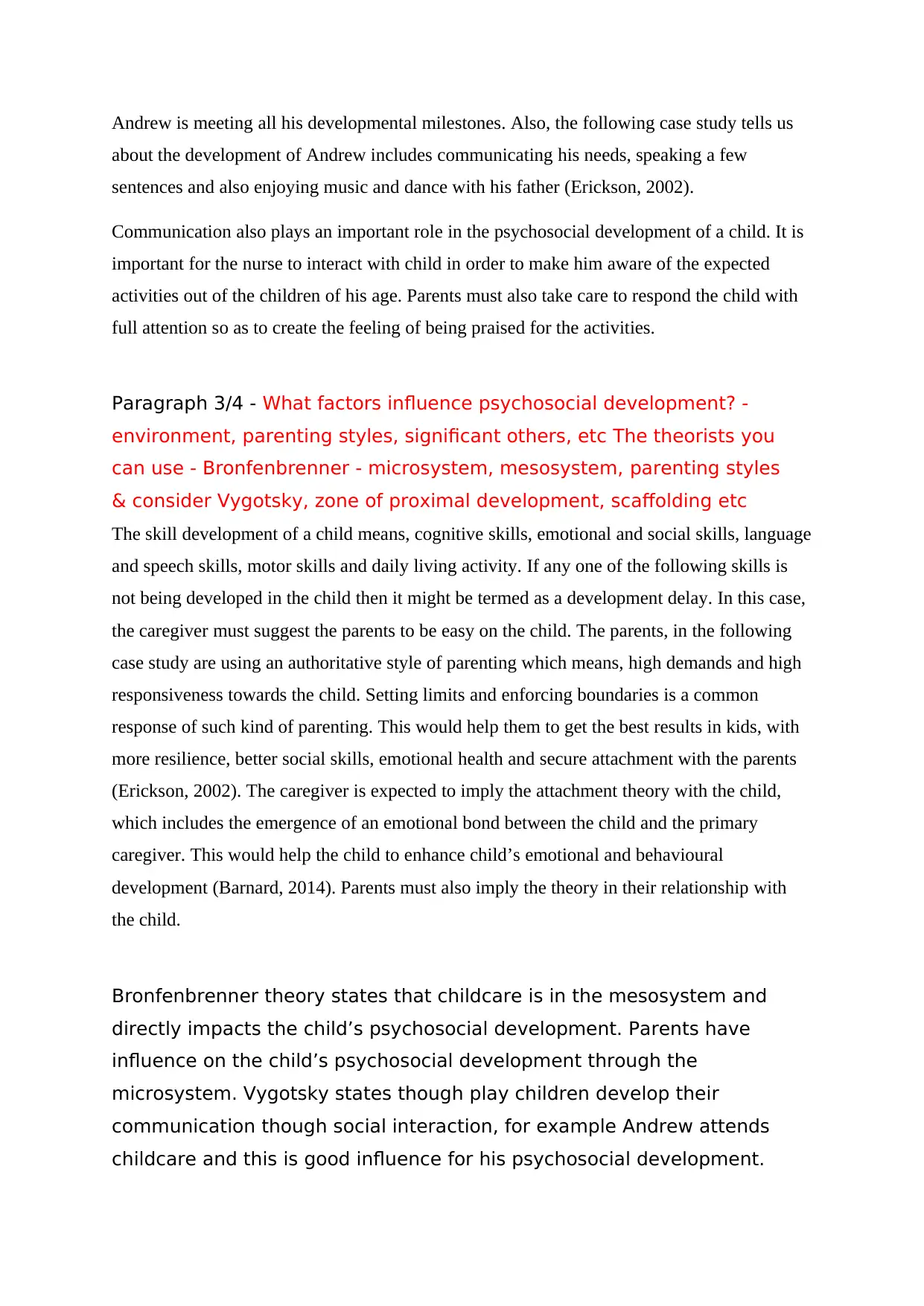
Andrew is meeting all his developmental milestones. Also, the following case study tells us
about the development of Andrew includes communicating his needs, speaking a few
sentences and also enjoying music and dance with his father (Erickson, 2002).
Communication also plays an important role in the psychosocial development of a child. It is
important for the nurse to interact with child in order to make him aware of the expected
activities out of the children of his age. Parents must also take care to respond the child with
full attention so as to create the feeling of being praised for the activities.
Paragraph 3/4 - What factors influence psychosocial development? -
environment, parenting styles, significant others, etc The theorists you
can use - Bronfenbrenner - microsystem, mesosystem, parenting styles
& consider Vygotsky, zone of proximal development, scaffolding etc
The skill development of a child means, cognitive skills, emotional and social skills, language
and speech skills, motor skills and daily living activity. If any one of the following skills is
not being developed in the child then it might be termed as a development delay. In this case,
the caregiver must suggest the parents to be easy on the child. The parents, in the following
case study are using an authoritative style of parenting which means, high demands and high
responsiveness towards the child. Setting limits and enforcing boundaries is a common
response of such kind of parenting. This would help them to get the best results in kids, with
more resilience, better social skills, emotional health and secure attachment with the parents
(Erickson, 2002). The caregiver is expected to imply the attachment theory with the child,
which includes the emergence of an emotional bond between the child and the primary
caregiver. This would help the child to enhance child’s emotional and behavioural
development (Barnard, 2014). Parents must also imply the theory in their relationship with
the child.
Bronfenbrenner theory states that childcare is in the mesosystem and
directly impacts the child’s psychosocial development. Parents have
influence on the child’s psychosocial development through the
microsystem. Vygotsky states though play children develop their
communication though social interaction, for example Andrew attends
childcare and this is good influence for his psychosocial development.
about the development of Andrew includes communicating his needs, speaking a few
sentences and also enjoying music and dance with his father (Erickson, 2002).
Communication also plays an important role in the psychosocial development of a child. It is
important for the nurse to interact with child in order to make him aware of the expected
activities out of the children of his age. Parents must also take care to respond the child with
full attention so as to create the feeling of being praised for the activities.
Paragraph 3/4 - What factors influence psychosocial development? -
environment, parenting styles, significant others, etc The theorists you
can use - Bronfenbrenner - microsystem, mesosystem, parenting styles
& consider Vygotsky, zone of proximal development, scaffolding etc
The skill development of a child means, cognitive skills, emotional and social skills, language
and speech skills, motor skills and daily living activity. If any one of the following skills is
not being developed in the child then it might be termed as a development delay. In this case,
the caregiver must suggest the parents to be easy on the child. The parents, in the following
case study are using an authoritative style of parenting which means, high demands and high
responsiveness towards the child. Setting limits and enforcing boundaries is a common
response of such kind of parenting. This would help them to get the best results in kids, with
more resilience, better social skills, emotional health and secure attachment with the parents
(Erickson, 2002). The caregiver is expected to imply the attachment theory with the child,
which includes the emergence of an emotional bond between the child and the primary
caregiver. This would help the child to enhance child’s emotional and behavioural
development (Barnard, 2014). Parents must also imply the theory in their relationship with
the child.
Bronfenbrenner theory states that childcare is in the mesosystem and
directly impacts the child’s psychosocial development. Parents have
influence on the child’s psychosocial development through the
microsystem. Vygotsky states though play children develop their
communication though social interaction, for example Andrew attends
childcare and this is good influence for his psychosocial development.
⊘ This is a preview!⊘
Do you want full access?
Subscribe today to unlock all pages.

Trusted by 1+ million students worldwide
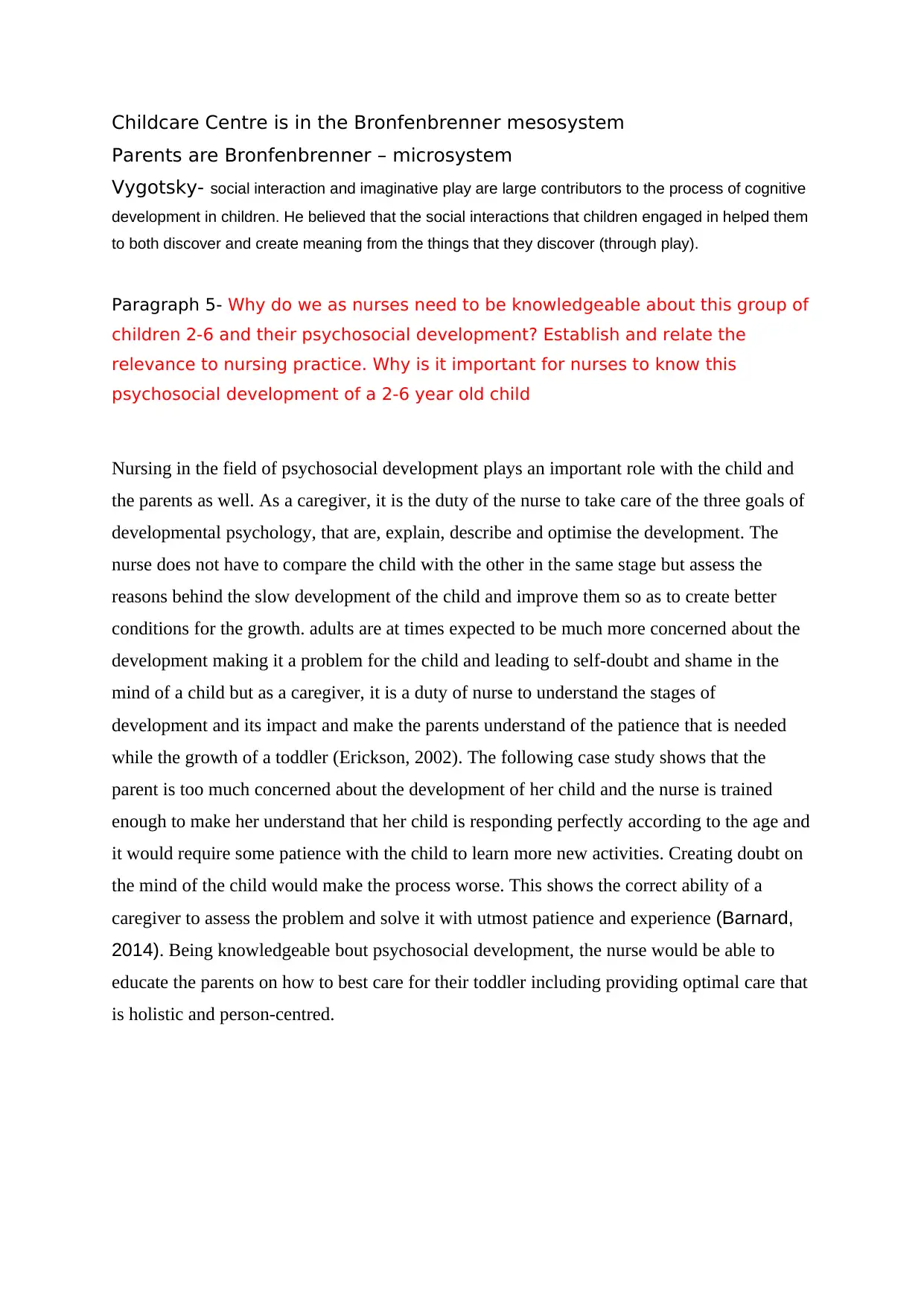
Childcare Centre is in the Bronfenbrenner mesosystem
Parents are Bronfenbrenner – microsystem
Vygotsky- social interaction and imaginative play are large contributors to the process of cognitive
development in children. He believed that the social interactions that children engaged in helped them
to both discover and create meaning from the things that they discover (through play).
Paragraph 5- Why do we as nurses need to be knowledgeable about this group of
children 2-6 and their psychosocial development? Establish and relate the
relevance to nursing practice. Why is it important for nurses to know this
psychosocial development of a 2-6 year old child
Nursing in the field of psychosocial development plays an important role with the child and
the parents as well. As a caregiver, it is the duty of the nurse to take care of the three goals of
developmental psychology, that are, explain, describe and optimise the development. The
nurse does not have to compare the child with the other in the same stage but assess the
reasons behind the slow development of the child and improve them so as to create better
conditions for the growth. adults are at times expected to be much more concerned about the
development making it a problem for the child and leading to self-doubt and shame in the
mind of a child but as a caregiver, it is a duty of nurse to understand the stages of
development and its impact and make the parents understand of the patience that is needed
while the growth of a toddler (Erickson, 2002). The following case study shows that the
parent is too much concerned about the development of her child and the nurse is trained
enough to make her understand that her child is responding perfectly according to the age and
it would require some patience with the child to learn more new activities. Creating doubt on
the mind of the child would make the process worse. This shows the correct ability of a
caregiver to assess the problem and solve it with utmost patience and experience (Barnard,
2014). Being knowledgeable bout psychosocial development, the nurse would be able to
educate the parents on how to best care for their toddler including providing optimal care that
is holistic and person-centred.
Parents are Bronfenbrenner – microsystem
Vygotsky- social interaction and imaginative play are large contributors to the process of cognitive
development in children. He believed that the social interactions that children engaged in helped them
to both discover and create meaning from the things that they discover (through play).
Paragraph 5- Why do we as nurses need to be knowledgeable about this group of
children 2-6 and their psychosocial development? Establish and relate the
relevance to nursing practice. Why is it important for nurses to know this
psychosocial development of a 2-6 year old child
Nursing in the field of psychosocial development plays an important role with the child and
the parents as well. As a caregiver, it is the duty of the nurse to take care of the three goals of
developmental psychology, that are, explain, describe and optimise the development. The
nurse does not have to compare the child with the other in the same stage but assess the
reasons behind the slow development of the child and improve them so as to create better
conditions for the growth. adults are at times expected to be much more concerned about the
development making it a problem for the child and leading to self-doubt and shame in the
mind of a child but as a caregiver, it is a duty of nurse to understand the stages of
development and its impact and make the parents understand of the patience that is needed
while the growth of a toddler (Erickson, 2002). The following case study shows that the
parent is too much concerned about the development of her child and the nurse is trained
enough to make her understand that her child is responding perfectly according to the age and
it would require some patience with the child to learn more new activities. Creating doubt on
the mind of the child would make the process worse. This shows the correct ability of a
caregiver to assess the problem and solve it with utmost patience and experience (Barnard,
2014). Being knowledgeable bout psychosocial development, the nurse would be able to
educate the parents on how to best care for their toddler including providing optimal care that
is holistic and person-centred.
Paraphrase This Document
Need a fresh take? Get an instant paraphrase of this document with our AI Paraphraser
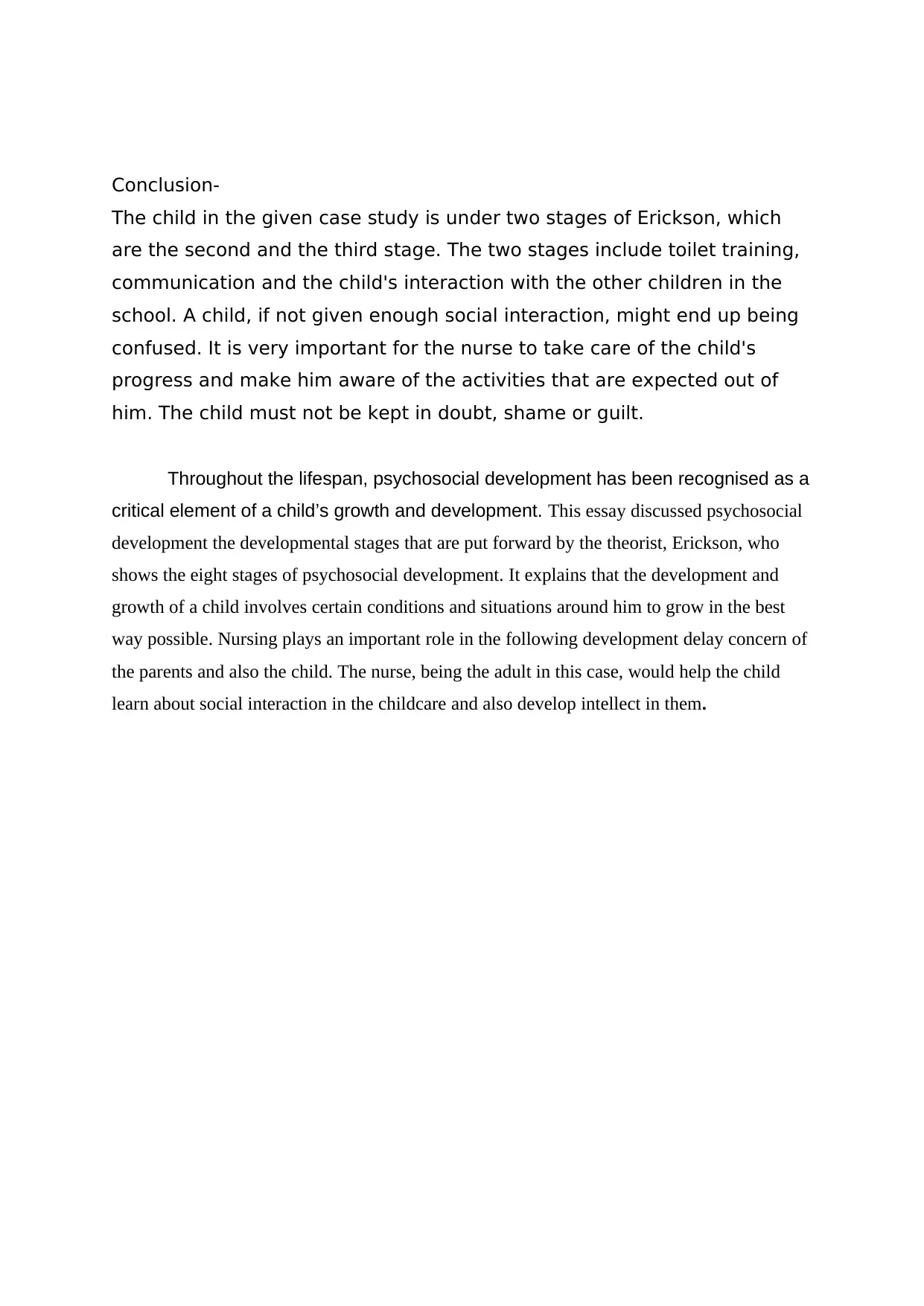
Conclusion-
The child in the given case study is under two stages of Erickson, which
are the second and the third stage. The two stages include toilet training,
communication and the child's interaction with the other children in the
school. A child, if not given enough social interaction, might end up being
confused. It is very important for the nurse to take care of the child's
progress and make him aware of the activities that are expected out of
him. The child must not be kept in doubt, shame or guilt.
Throughout the lifespan, psychosocial development has been recognised as a
critical element of a child’s growth and development. This essay discussed psychosocial
development the developmental stages that are put forward by the theorist, Erickson, who
shows the eight stages of psychosocial development. It explains that the development and
growth of a child involves certain conditions and situations around him to grow in the best
way possible. Nursing plays an important role in the following development delay concern of
the parents and also the child. The nurse, being the adult in this case, would help the child
learn about social interaction in the childcare and also develop intellect in them.
The child in the given case study is under two stages of Erickson, which
are the second and the third stage. The two stages include toilet training,
communication and the child's interaction with the other children in the
school. A child, if not given enough social interaction, might end up being
confused. It is very important for the nurse to take care of the child's
progress and make him aware of the activities that are expected out of
him. The child must not be kept in doubt, shame or guilt.
Throughout the lifespan, psychosocial development has been recognised as a
critical element of a child’s growth and development. This essay discussed psychosocial
development the developmental stages that are put forward by the theorist, Erickson, who
shows the eight stages of psychosocial development. It explains that the development and
growth of a child involves certain conditions and situations around him to grow in the best
way possible. Nursing plays an important role in the following development delay concern of
the parents and also the child. The nurse, being the adult in this case, would help the child
learn about social interaction in the childcare and also develop intellect in them.
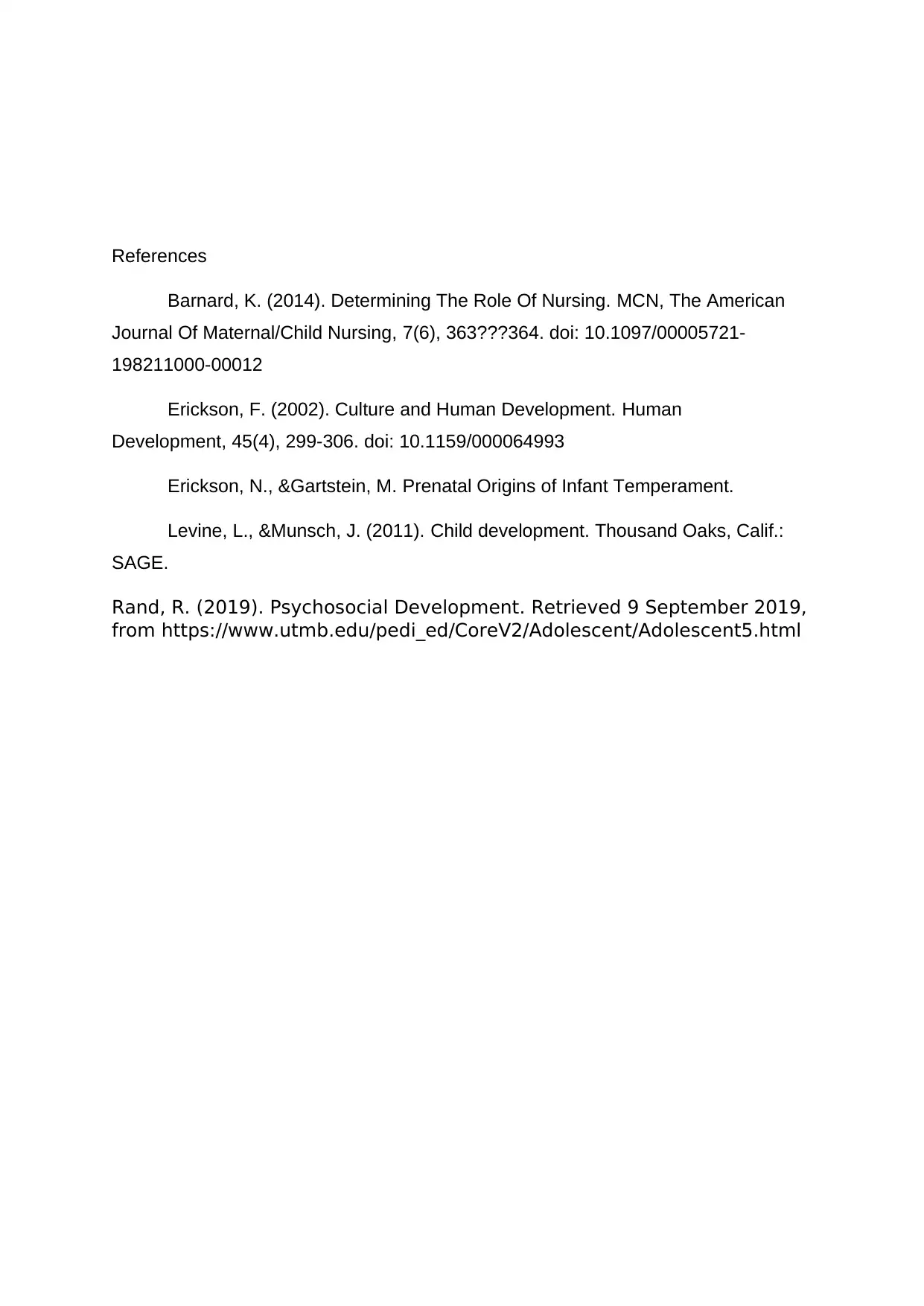
References
Barnard, K. (2014). Determining The Role Of Nursing. MCN, The American
Journal Of Maternal/Child Nursing, 7(6), 363???364. doi: 10.1097/00005721-
198211000-00012
Erickson, F. (2002). Culture and Human Development. Human
Development, 45(4), 299-306. doi: 10.1159/000064993
Erickson, N., &Gartstein, M. Prenatal Origins of Infant Temperament.
Levine, L., &Munsch, J. (2011). Child development. Thousand Oaks, Calif.:
SAGE.
Rand, R. (2019). Psychosocial Development. Retrieved 9 September 2019,
from https://www.utmb.edu/pedi_ed/CoreV2/Adolescent/Adolescent5.html
Barnard, K. (2014). Determining The Role Of Nursing. MCN, The American
Journal Of Maternal/Child Nursing, 7(6), 363???364. doi: 10.1097/00005721-
198211000-00012
Erickson, F. (2002). Culture and Human Development. Human
Development, 45(4), 299-306. doi: 10.1159/000064993
Erickson, N., &Gartstein, M. Prenatal Origins of Infant Temperament.
Levine, L., &Munsch, J. (2011). Child development. Thousand Oaks, Calif.:
SAGE.
Rand, R. (2019). Psychosocial Development. Retrieved 9 September 2019,
from https://www.utmb.edu/pedi_ed/CoreV2/Adolescent/Adolescent5.html
⊘ This is a preview!⊘
Do you want full access?
Subscribe today to unlock all pages.

Trusted by 1+ million students worldwide
1 out of 6
Related Documents
Your All-in-One AI-Powered Toolkit for Academic Success.
+13062052269
info@desklib.com
Available 24*7 on WhatsApp / Email
![[object Object]](/_next/static/media/star-bottom.7253800d.svg)
Unlock your academic potential
Copyright © 2020–2026 A2Z Services. All Rights Reserved. Developed and managed by ZUCOL.





